Removing Boalt Hall’s name helps campus climate, undergrad says
Victoria Vera sits on chancellor's Building Name Review Committee
January 30, 2020
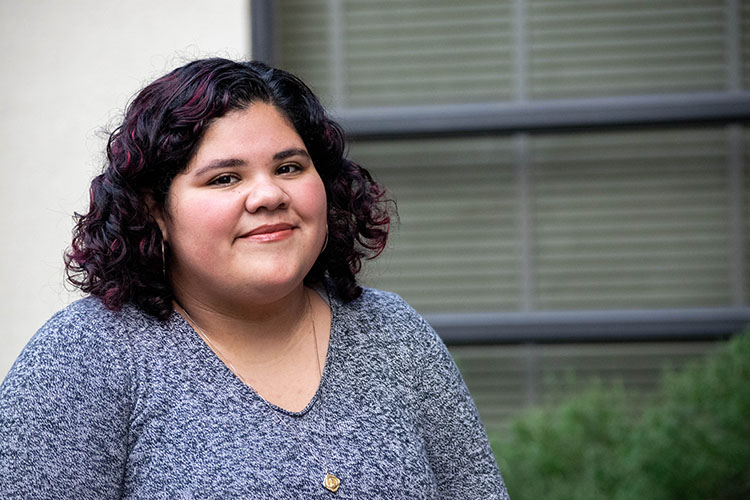
“As a current first-generation student of color,” says undergraduate Victoria Vera, a member of the chancellor’s Building Name Review Committee, “I know how it feels to be isolated on this large campus and to know that this institution, when it was founded, was not designed for me to succeed.” (UC Berkeley photo by Irene Yi)
Today’s denaming of Boalt Hall involved work done by Victoria Vera, a third-year UC Berkeley political science major from Sacramento who’s minoring in human rights. The first-generation college student and self-described “Chicana feminist,” who says she aspires to being California’s governor one day, sits on Chancellor Carol Christ’s Building Name Review Committee, which voted unanimously to remove 19th century Oakland attorney John Henry Boalt’s name from the law school.
Berkeley News asked her about the importance of a building’s name, the process it took to remove Boalt’s name from the law school and the ways she’s helping to fight for equity and inclusion on campus.
How did you become a member of the chancellor’s Building Name Review Committee, and why is it important for students to be at the table?
Read more
– Chancellor Carol Christ: Why we denamed Boalt Hall
– How UC Berkeley decided to remove Boalt’s name
I first learned about the movement to change the names of some of the buildings on campus through former students who advocated for it. This led me to help establish RECLAIM, a student group on campus that advocates for the removal of buildings’ names through education and research. I also serve as the ASUC Diversity Affairs Commission chair, and I was selected by ASUC executive officials to serve on the Building Name Review Committee. When appointed, I took a step back from RECLAIM, because it was important to me to make sure that there was not a conflict of interest. Being a part of this committee is important to me, because it’s a way for me to make this campus more inclusive.
It is vital to have students on the Building Name Review Committee, because they know the intricacies of campus climate and can challenge the university to see if it’s upholding its own beliefs and community guidelines. As a current first-generation student of color, I know how it feels to be isolated on this large campus and to know that this institution, when it was founded, was not designed for me to succeed. Allowing students on this committee helps redefine what UC Berkeley stands for, currently.
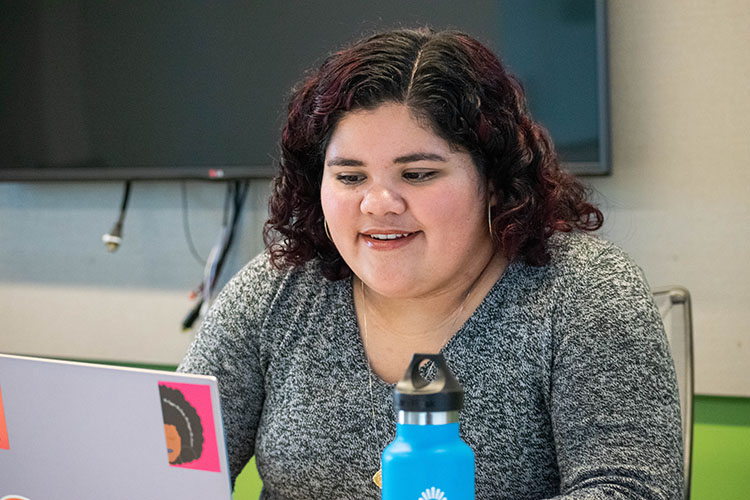
Vera, a political science major, was tasked with reading the public comments solicited by the campus about the proposal to dename Boalt Hall. (UC Berkeley photo by Irene Yi)
When you learned of John Henry Boalt’s racism, why was it vital to you that Boalt Hall be denamed? What’s so important about a building’s name?
When I first heard of John Henry Boalt, I was completely taken aback. Boalt crafted legislation that led to the 1882 Chinese Exclusion Act. When discussing if his name should be removed, people said we should look at his legacy to also see the positive contributions he made. But to be frank, Boalt’s legacy is based on exclusion. Honoring him on campus conserves the intention of the founders of the university that did not include underrepresented students. To think that John Henry Boalt never wanted a student like me to have access to the opportunities of higher education puts a sobering light on the university’s history.
Is removing the name of a building enough?
Though the committee could not make direct decisions about the aftermath of our vote, we did emphasize the importance of restorative justice, that the university should not stray from the conversations that surround John Henry Boalt’s racism, but instead be working toward creating space for healing, cultural understanding and uplifting Berkeley community guidelines and values.
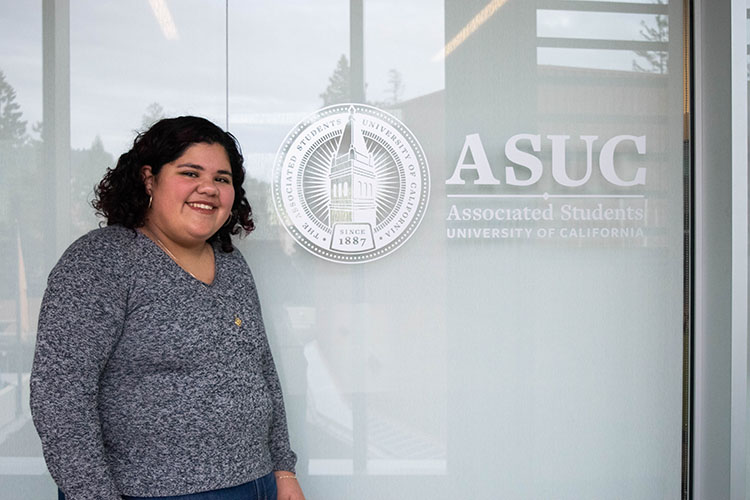
Victoria Vera is chair of the ASUC’s Diversity Affairs Commission, which was created to empower and mobilize underrepresented groups and organizations on campus to promote diversity, inclusion and equity. (UC Berkeley photo by Irene Yi)
What was the Building Name Review Committee’s process, once it received a proposal to dename Boalt Hall?
After receiving the law school’s recommendation to remove the Boalt name, our committee took several months to gather input on the proposal from the campus community and beyond. Then, in the fall of 2019, we reviewed these comments. One aspect that I liked about this was that I was tasked to read public comments, from alumni from the Class of ’60 to current students. It really opened my eyes to how large the UC Berkeley community is, and I heard starkly different responses about removing the Boalt name. Of the 620 responses we received, the majority favored denaming.
Finally, we met to discuss the feedback, as well as to offer our own perspectives on changing the name, the pros and the cons of doing so, how we might make sure not to erase that history, and more. After that, we took a vote, which was unanimous in favor of removing the Boalt name. We then together drafted a letter to the chancellor detailing our decision. I was very pleased to see that she agreed wholeheartedly with our recommendation.
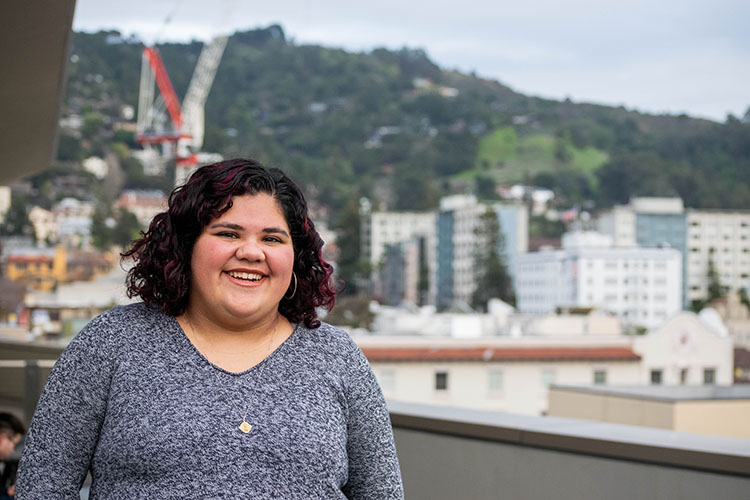
“Don’t be discouraged,” Vera advises those who realize the research involved in submitting a strong proposal to the Building Name Review Committee. (UC Berkeley photo by Irene Yi)
What do you look forward to in the near future, as a member of the Building Name Review Committee?
I’m looking forward to more proposals coming to the committee to review the history of buildings’ names. This is the first one on our campus, but there are several other buildings on our campus with a history we should reconsider. Unearthing the history embedded on this campus is vital to the progress of the university. Who we honor with these buildings reflects our community guidelines and values. Honoring Boalt’s legacy, which included the Chinese Exclusion Act, legitimizes exclusion on the UC Berkeley campus. Having a chance to reclaim the campus, redefine what our community looks like — who is a part of the Golden Bear community — is an important job, but also vital to the longevity of the campus community.
What should students, staff or faculty do if they want to explore a building’s name or find information that causes them to want denaming considered?
If anyone’s interested in learning more about the people that campus buildings are named after, I always suggest a quick Google search, but, of course, that will be sanitized history. To go deeper, access the university’s archives and read (a building namesake’s) novels, research, manuscripts, etc. Another suggestion is not to do this alone. It’s a lot of work that’s emotionally labor-intensive. Forming a group like RECLAIM gave me a community of people that I could bounce ideas off of, but also find support from.
To create a proposal to present to the Building Name Review Committee can take some time, due to the amount of research that’s needed to build a strong proposal. Don’t be discouraged.
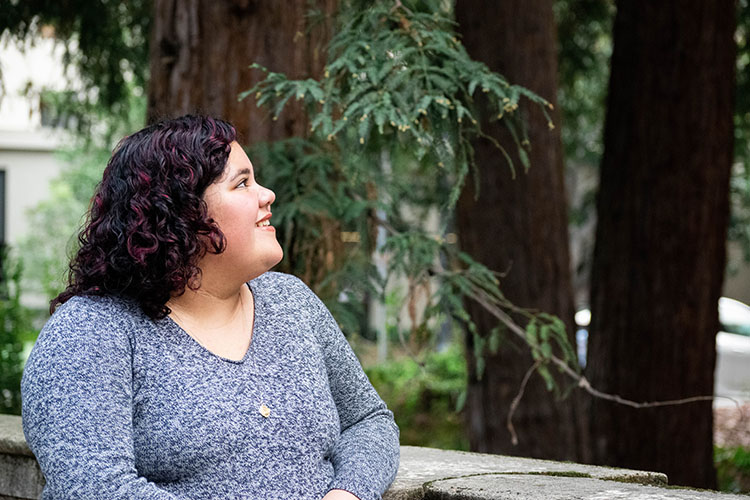
Berkeley “should not stray from the conversations that surround John Henry Boalt’s racism, but instead be working toward creating space for healing, cultural understanding and uplifting Berkeley community guidelines and values,” says Vera, who aspires to be California’s governor or to work in public policy. (UC Berkeley photo by Irene Yi)
More broadly, how can members of the UC Berkeley community overcome issues of feeling excluded and unequal? And what other efforts are you involved in to advocate for equity and inclusion?
When trying to combat institutional and historical exclusion and inequality, it’s crucial that we stop uplifting white supremacist ideologies and revisionist histories. We must confront the violent history and exclusionary practices that happen to people and continue to happen through the ramifications of the past. There’s a need to sanitize these narratives in order to make them more digestible to the masses, but what this ultimately does is erase people from their narratives.
There’s always hope for change. Seeing my peers work diligently to press the administration on creating more access and equality is what keeps the fire in me alive to continue my work. Some other work that I’m a part of includes being on the ASUC Diversity Affairs Commission, where we’re encouraging students to report hate crimes, since there is a general lack of knowledge about what to do when these incidents occur. The commission is also compiling data on the Department of Ethnic Studies, which is experiencing the impact of a lack of funding.
My professional goals are to make and maintain space for marginalized groups. Space is not just physical, but also pertains to access to resources and making sure that their voices are heard through government. Through my advocacy, I hope I can maintain a sense of dignity and humanity to my communities by one day becoming governor of California, or by working on public policy.
Berkeley’s preparing me for the future by allowing me to build a community of people to grow and learn from. My community on campus has allowed me to imagine, to throw my dreams out there. But it’s also mentored me through challenges and obstacles.